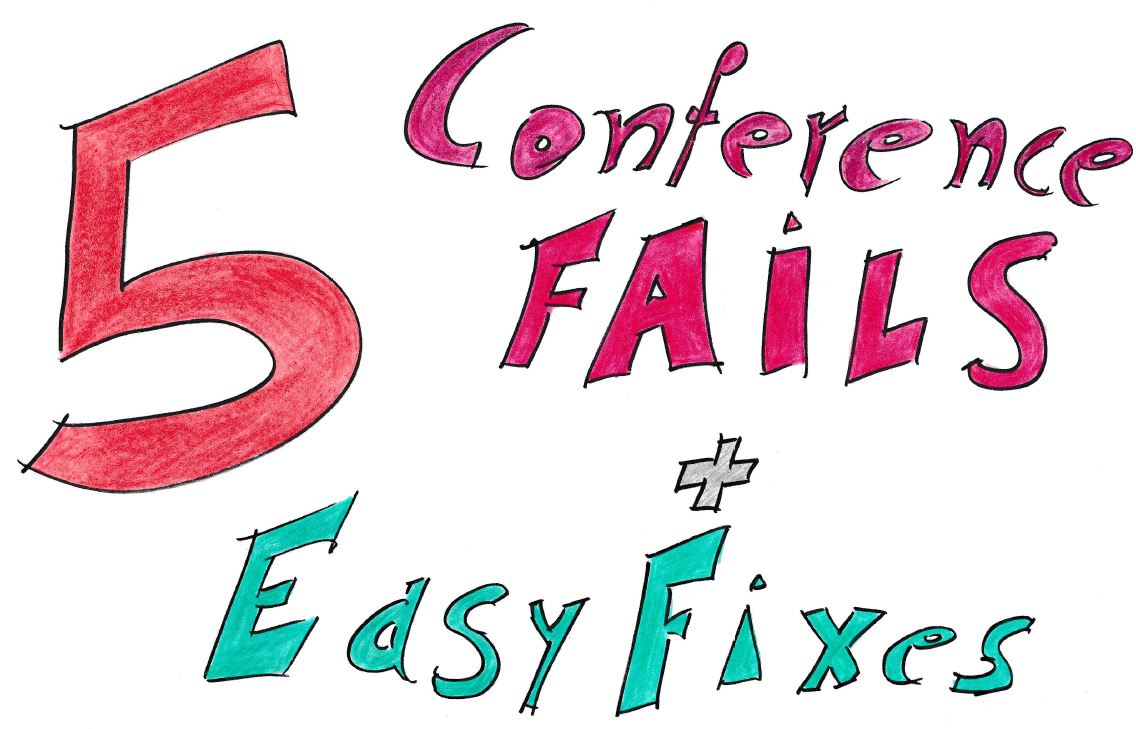I’ve been to many conferences in my time. Too many. And while there have been some great presentations there have also been some epic fails. Fails which could have been easily avoided. I was at a conference recently so here are five fails I came across and five fixes.
1. Not familiar with content
While the presenter was well qualified in their subject area they clearly weren’t familiar with their own presentation. They didn’t seem to know which slide was coming next and even why some of the slides were there at all.
I suspect this happens because many presenters are putting their presentation together at the last minute – often on the plane to the conference or late the night before. This means that there isn’t enough time for them to practice the content. Their first run through of the material is in front of the live audience.
Fix: Practice, practice, practice
Practice means reading through your notes and the slides many times. But it also means reading the content out loud. It will sound a lot different than reading it quietly in your head.
2. Reading a paper
The presenter wrote an academic paper and then proceeded to read it to us. Reading anything reduces the spontaneity but reading an academic paper is mind-numbing. The problem is that we don’t talk the way we write. When you write you will be trying hard to be grammatically correct. You’ll probably have long sentences and complicated words. When we speak naturally, we are not always grammatically correct, we use shorter sentences, and more commonly used words. So reading an academic paper often comes across as stilted.
Fix: Write out what you will say
As well as the academic paper you need to prepare notes of what you will actually say. These need to be written in a more conversational style. You probably won’t read these but they are your back-up. And don’t assume you’ll remember clever things to say on the day. When you are anxious, all those good ideas will disappear. So write them down.
3. Technology fails
The person brought along their own laptop which of course didn’t easily attach to the connections on the lectern. When they did finally get it connected, their desktop appeared on the projection screen and as they searched through their files we all got to view their recently downloaded movies and various other files. Another person thought it would be a good idea to have their notes on their tablet, which of course froze half-way through their presentation.
Fix: Check and double check the technology
Technology will always let you down and the more stressed you are the more likely it is that things will go wrong. So check everything out, with the equipment in the venue, several times before your talk. And keep things as simple as you can. Print out your notes because paper always works.
4. Timing fails
Over and over again presenters said “I’m out of time but there’s a few slides I’ll just go through quickly”. Which meant that the presentation ended in a bit of a rush and often the key point was lost.
Fix: Read your presentation out loud and time yourself
Practice reading your presentation out loud with a timer. If your slot is for 15 minutes and you’ve got 25 minutes worth of material go though and delete 10 minutes worth of content. Then read it out loud again and time yourself again.
5. Too much information
The difficulty for many of the presenters was that they wanted to present their last three years of research in 15 minutes. And so they packed in far too much information, far too many slides, too many tables and graphs, too many words. Which meant as an audience member I was overwhelmed by too much detail and really couldn’t figure out what the main point was. I think another reason presenters do this is that they are worried about running out of things to say. In my experience this has rarely been a problem.
Fix: Two or three main points and leave out a lot
Identify two or three main points that you want to get across. Include these in your introduction, elaborate on them in the main part of your talk and then summarise them again at the end. This will mean leaving out a whole lot of detail. You can mention that more information is available if people want to talk to you afterwards.
Most of th e fixes I’ve suggested come down to preparation and practice. We all know that we get better at things the more we practice them.
e fixes I’ve suggested come down to preparation and practice. We all know that we get better at things the more we practice them.
The first time is not going to be great, the second time will be better and by the fifth time it might be getting good.
For most presenters their first practice is the final run so no wonder things go wrong. Practice is the key.

Great hints and tips, I’ll bear all of these in mind.